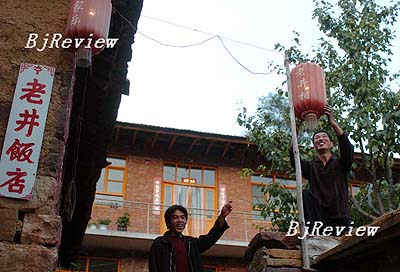|

While China has experienced rapid economic development in recent years, it has been heavily weighted toward certain parts of the country. Large cities such as Beijing and Shanghai, as well as much of east and south China, have reached the economic standard of middle-income countries, while western regions have fallen far behind. Although many people have been lifted out of poverty along with the nation's economic progress, around 100 million people still remain in need of economic aid and 21 million others in abject poverty have an annual income of only 683 yuan (about $90).
A county's story
The country's uneven development landscape can be seen at Zuoquan County in Shanxi Province, which lies only 527 km southwest of Beijing. Zuoquan, 150 km to Taiyuan, the provincial capital, is located in a mountainous area. The county's geography made it a perfect guerrilla base for the Eighth Route Army led by the Communist Party of China (CPC) during the War of Resistance Against Japanese Aggression (1937-45).
Though enjoying the fame as the seat of the headquarters of the Eighth Route Army, Zuoquan found its mountainous terrain became a barrier to its development in peaceful times. Its economy did have benefited from the country's economic boom since reform and opening up which began in late 1978, but it is still classed as a key county for the national poverty-relief program.
The current group of government officials in Zuoquan, bold and open-minded, have actively introduced market economy schemes to this backward county. In 2001 and 2002, all the state-owned enterprises in Zuoquan were sold to individuals or restructured into shareholding companies. This attracted large sums of private investment and helped to revitalize local enterprises.
Yet, Zuoquan still performed poorly in attracting overseas investment for large-scale projects due to its geographic location, and its small industrial sectors experienced a slow decline owing to their outmoded equipment. This forced the local government to find new ways to reverse such a plight.
"People here are hardworking, but they lack the sense of modernization," said Sun Guangtang, Party Secretary of Zuoquan County. He said in order to broaden local people's vision, the county government sent batches of people on experience-learning trips to cities in developed coastal areas and even sent some entrepreneurs abroad to learn advanced management expertise. Meanwhile, it invited experts from other localities to introduce advanced management expertise and help draw up development blueprints for the county.
These efforts have yielded a series of new measures spurring economic development in Zuoquan. The county has maintained a high GDP growth rate in the last few years, with that for 2006 hitting 11.6 percent. The recent development spurt of Zuoquan often surprises its home-coming migrant workers.
Better life
A large proportion of Zuoquan's population resides in rocky and forbidding mountainous areas, which used to be cut off from civilization by high mountains. The area was so remote that when the county government sent messengers to inform the villagers of Laojing of the founding of the People's Republic of China in 1949, they asked whether the Japanese invaders had retreated. This was almost five years after Japan's surrender in 1945.
Water was once so precious in the village that the impoverished villagers built a temple to pray for rain. There are 151 wells in the village, which cost several villagers' lives to dig, all of which are now dry. Back then, water for villagers' basic life could not be guaranteed.
| 